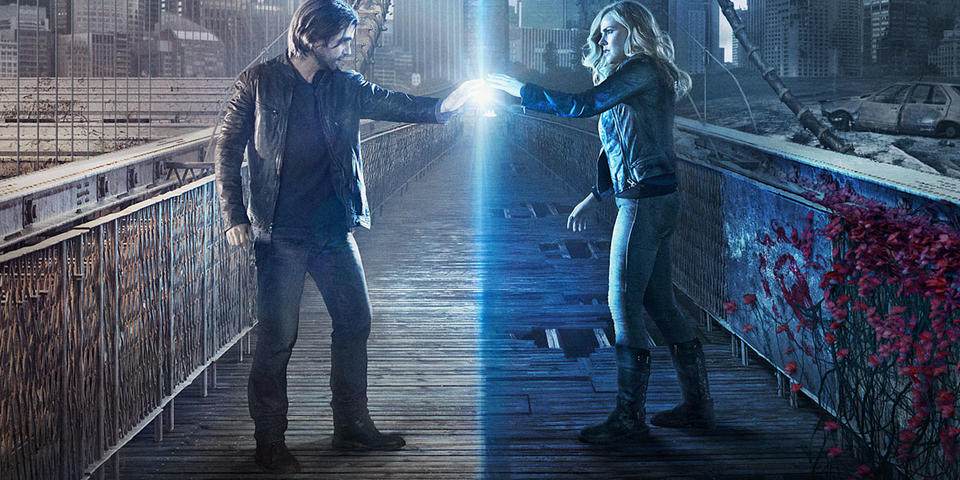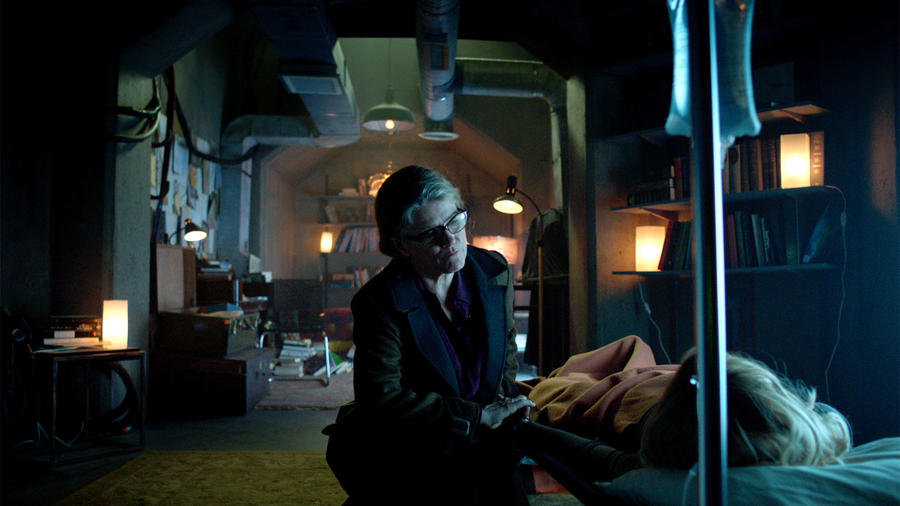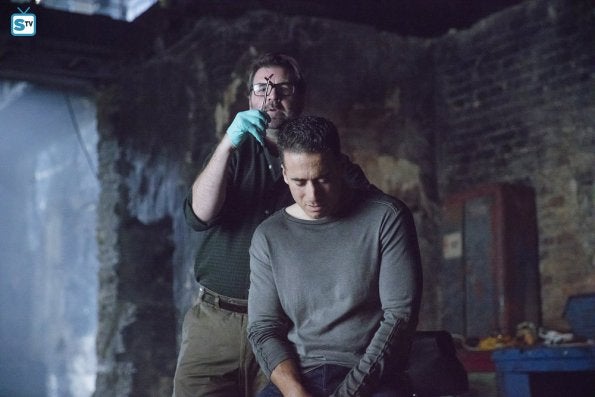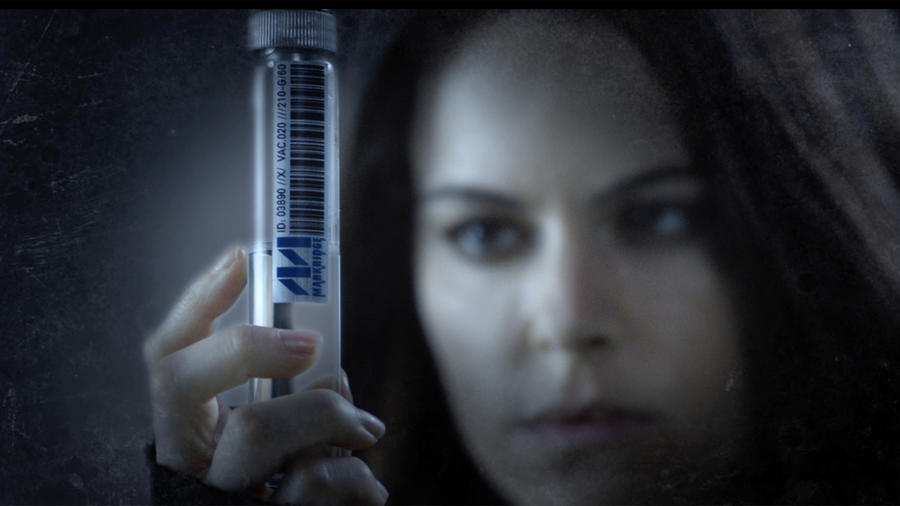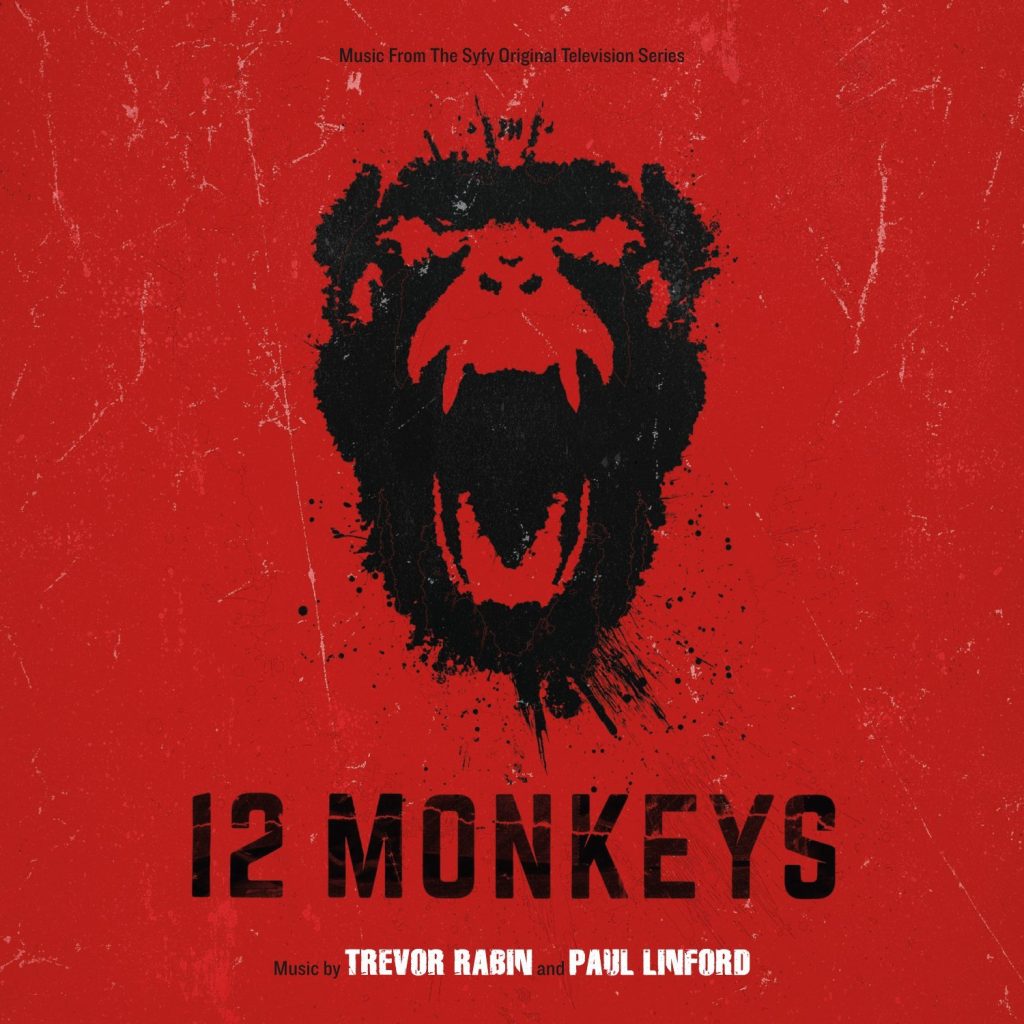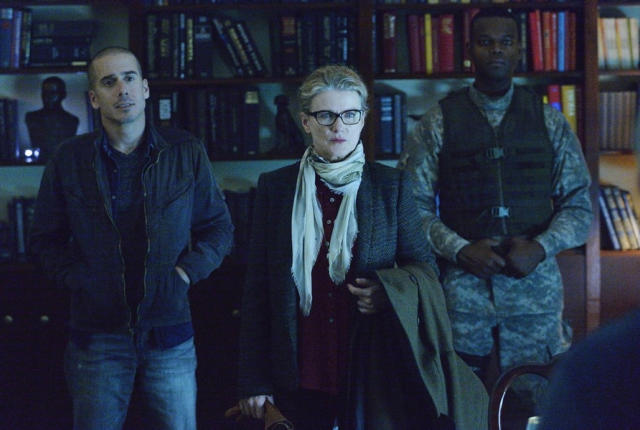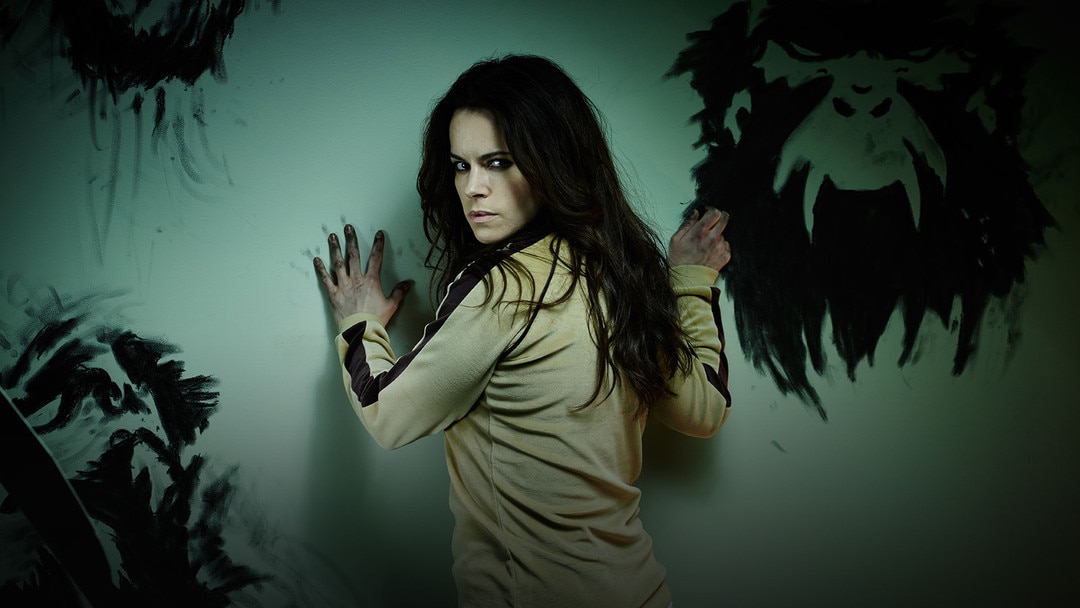Author's note: I've been working on this entry for a looooong time, and originally meant to post it during Shark Week but then decided since
DBS is ostensibly a horror film, it would make for an appropriate Halloween observance. So on with the skewing...err...reviewing.
Content warning: this essay contains excessive amounts of shark snark and SPOILERS! for
Deep Blue Sea. Also, I didn't include images this time because this is a rather long piece; I hope that won't diminish your reading experience, but if it does I offer my apologies.
Although I'm a bit late in my observation of Shark Week, recently horror media site
Bloody Disgusting published an editorial on five extremely underrated horror film scores and one of the selections was Trevor's score for
Deep Blue Sea, released in 1999.
http://bloody-disgusting.com/editorials/3342934/underrated-horror-movie-score/2/
I would be apt to agree from the perspective of noting that it resides in the trend of Trevor composing excellent scores for movies which really don't deserve them. While I feel this might be considered a controversial opinion, I will say Trevor appeared to agree with it when I stated it to him during our interview exchange back in 2012.
Those of you who overall don't particularly care for the oeuvre of Trevor's film scoring and don't bother to see the movies or collect them on DVD/Blu-ray, I will say that you
should own a copy of
DBS because it contains, within the Behind The Scenes documentary ("When Sharks Attack!" - the section on the score begins at 12:20 in the documentary), comments from Trevor and footage of him working with Renny and the orchestra during a spotting session. Renny and Trevor have a great friendship - which in part explains why they've collaborated on four films - and as this was their first project together, it's interesting to note their camaraderie even then.
What is significant to me regarding Trevor's score for
DBS is it contains one of his most beautiful and haunting themes, "Aftermath," which was later used in the trailer for the film
A Beautiful Mind. With piano and strings, it is wholly illustrative of Trevor's abilities at marrying emotion and elegance, it is sparse but then builds to a grandeur which is wonderfully melodic, and then transitions to an acoustic guitar part which is also simple but beautiful before the orchestra and choir return for the finish. The theme is reprised in the cue "Doctor's Orders" and the theme "Susan Softens."
As to the film, I have gone on record as stating that I don't particularly care for the films of Renny Harlin, so my impressions of this film are going to be colored by my overall stylistic distaste but this was back when Hollywood was giving Renny money and opportunity to be an action movie Golden Boy so as ridiculous as it might be,
DBS has some charm to it, and part of that charm is centered in Trevor's score. This was the first horror film he had ever scored, and as he always looked to any genre he encountered as a challenge, he did his best to take it on to the fullest extent as a composer.
Sharks, as the implacable, unassailable and enigmatic predators of the sea, make good villains. But in any ensemble-cast horror movie, we know ultimately that humans are their own worst enemies due to their ignorance and their arrogance. In some ways this is a haunted house movie, given the isolation of the scientific facility and the stress of the situation even without the threat of bio-engineered sharks. But the tagline of this movie is
Bigger. Smarter. Faster. Meaner. and...hell, why not add
Scarier. (?) But that would be too obvious, right? (Spoiler: they're really
not.)
Harlan notes in his director's commentary that the opening scene of the film is an homage to
Jaws, and I think the audience gets that but....it doesn't even come close to invoking the dread which its ancestor presented to our atavistic imaginations. There is another visual nod to the film somewhat later on, which, if you've watched
Jaws enough times, you will spot immediately. We see two couples getting their drunken groping on offshore and then a little red wine is spilled into the water which seems to
suddenly draw a shark which bursts through the bottom of the sailboat. Chaos ensues but the party is rescued by a well-placed harpoon capture thanks to one of those iron-jawed ruggedly handsome kind of guys who are just patrolling the oceans waiting for disaster, am I right? Yeah, so...like I said,
ridiculous.
Cut to: the red sunset haze of Los Angeles wherein Dr. Frankenshark is so incensed at the media fallout of her escaped shark snafu she has come to yell at her exorbitantly wealthy boss, Samuel L. Jackson (who could give any shark a run for its money in the charisma department, of course). The name of his corporation is Chimera, which is an anvilicious sort of reference, oy vey. Suddenly they're on a sea plane, headed to said facility, Aquatica Research. The doctor is not only a brilliant genetic researcher, she's licensed to fly a seaplane! I appreciate giving women agency in narrative, of course, but this comes off a little Mary Sue-ish for my tastes.
Oooh look, it's the iron-jawed hunter! Thomas Jane is a damn fine-looking man, I gotta say, and he's perfect for the role of The Shark Whisperer. But Dr. Frankenshark is immune to his charms, even soaking wet. She's All Science, All The Time.
In a clearly Hitchcockian nod, Renny appears in his own movie - and he could have actually played a minor character, such is his lanky long-haired surfer dude persona.
In the director's commentary, Samuel L. Jackson notes that Stellan Skarsgard is "probably slumming" in this movie, and boy he ain't kidding! But such is the wackiness of this ensemble, really, in terms of casting, with a mix of serious and comedic characters and acting therein. Intense people are intense, goofy people are goofy (even when the shark hits the fan, as it were). Michael Rapaport is great comic relief, and his chemistry with LL Cool J provides moments in which the audience can relax. It's interesting to see how big Rapaport plays in comparison to Jane's terse circumscription, for example. It's textbook, and that's one of my complaints with the film in general. There's no subtlety
at all.
A squall is on the way, and all non-essential personnel have vacated, leaving the rest in what could also be considered a locked-room kind of narrative...except that we know
Whodunit? What we don't know is how the shark got out...but wait, oh yeah, because reasons: of super intelligence.
We see Dr. Frankenshark continuing with her
Success At All Costs, But At What Price? research efforts, her true agenda a secret from her colleagues as well as her boss, and there is also an directorial agenda (stated by Harlin in his commentary) to make her the real villain. I appreciate that she is a villain by virtue of her intelligence and although she is just another mad scientist, at least
she is the one, because you see very few women occupying this trope.
This is followed by some dick-waving between Jackson and Jane, with Jane giving a Soul Surfer kind of vibe to The Shark Whisperer. Then we're in the kitchen with LL Cool J and he and that parrot are the heart of this story, thank you Jesus. That parrot, y'all,
best thing in this movie. Everyone keeps staring at the portholes in an ominous fashion, which is telegraphing
so hard you don't even need the music to do it.
We learn the bio-engineered sharks are much like the Velociraptors in
Jurassic Park: fast, smart, vicious and they hunt in a pack. These sequences are the most obvious kind of CGI, and even with the advances they had at their disposal it's not entirely successful. Harlin notes in his commentary it was a composite of live action, animatronic and CGI elements in order to look seamless, but the problem is we
can see the seams and that detracts from whatever scariness we're meant to experience.
Night falls on Aquatica...and the crew throws a surprise birthday party for Dr. Frankenshark, which is the payoff of the cake we saw earlier. Thank goodness, because I would have spent the entire movie worrying about whether anyone was able to eat the cake. It's
important.
Cut to: Dr. Frankenshark and The Shark Whisperer having a moment, which is intercut with various exposition, and ultimately they are on opposite sides of whatever argument they're having, which again, there is no subtlety in this kind of trope. You're either for the sharks or you're exploiting the hell out of them For Science. And that's just so eye-rollingly
obvious. Even with the consideration that Dr. Frankenshark is dealing with the pain of personal loss by said exploitation, Saffron Burrows' performance is little more than a cardboard cut-out...Harlin speaks of walking a fine line with the portrayals but I want to know what movie he's watching, because I don't think it's
Deep Blue Sea.
Day two of The Isolation and most everyone gathers in the Wet Lab for the shark-and-shark show - mind you, this is a little over 20 minutes into the movie. The storm is closing in so there's another element of (expected) tension...this could be a Gothic romance, almost, just replace whatever supernatural beings with sharks. Seriously though, that swim by The Shark Whisperer through the murky lengths of the underwater cage? Pure Gothic terror right there. The sharks attempt to corner him in one section, again displaying a pack behavior which isn't supposed to be existent instinct. And
then...they take out the surveillance cameras.
OH SH(ARK)!
The Shark Whisperer has one of those Don't Go In The Basement moments wherein he decides go outside the cage to check the cameras. Mind you, the other sharks
ate the one he made friends with earlier, so this is the level of genius that the Aquatica braintrust exhibits on the whole. Most of the facility is underwater as well so...we already know how this is gonna go, right? Right. But then...FAKE OUT! The Shark Whisperer has fooled the super-smart shark stalking him and manages to tranquilize and bring it into the lab. Harlin notes that he went with a sort of Retro-Futurism look for the lab so it would be relatable to the audience. He states it is an "unusual" design, but...does
no one know that nothing has been original since
Alien, twenty years its' senior? And also again, nowhere near the dread factor of
that movie.
There's an effective jump-scare in the examination sequence, but that's nothing compared to the
OH SH(ARK)! moment when the sedated shark was only
pretending to be sedated...and...Stellan Skarsgard's arm is the first casualty. Now, this causes The Shark Whisperer to attempt to go medieval on its amphibious ass, err, fin, but Dr. Frankenshark is having none of that - that's her prized lab shark which is going to cure Alzheimers with its super-smart brain fluid, so she sets it free. Something tells me she's gonna live to regret that decision...or not live, as the case may be.
So now they're attempting to Medivac the injured Stellan outta there
stat, but when they get to the surface,
HOLY STORM FRONT! Like I said, this might as well be a Gothic novel. And soon enough, the rest of him follows his arm as the first course. You know what they say: once it gets a taste for human flesh...and then both the Medivac helicopter and Brenda the Radio Gal are
toast. The first time I saw this movie, I turned to my friend and said: "Whatcha wanna bet the fat chick gets it first?" I was pretty close, wouldn't you say? The fat chick is
never the Final Girl, thank you sexist Hollywood filmmakers.
Everything just blows the fuck up, people fall over, chaos and panic ensue, we are now a little over half an hour into the movie. Not that we
need any story when we can have explosions and mayhem by Harlin's logic, but seriously, we don't even know these characters, why should we feel sorry for
any of them? Despite Renny's insistence that the pacing be fast because what matters is the shark, I disagree. The horror would be far more horrific if we were actually invested in the story and characters
at all. Well okay, I
care about the parrot, but that is
it.
Meanwhile,
literally everything blows the fuck up, and LL Cool J finds the cooking sherry miraculously spared, so he swigs it down. Drink up my man, because the shark has hit the fan for sure.
In the Wet Lab, everything is terrible, and they are all transfixed by something approaching the ginormous observation window...you know how on
SNL they had that Candygram skit and it was always a landshark?
Yeah.
SPECIAL DELIVERY, HUMANS! THE SHARKS ARE 5000% DONE WITH YOUR SHIT.
The truly horrible thing is that Stellan is alive when the shark throws him into the observation window like a rabid UPS driver delivering a box of priceless bone china.
Smash! And they're all just standing there, like,
WHA?!, and Samuel L. Jackson calmly says, "Okay people, let's move," like it's a planned fire drill, but they don't move fast enough, of course, and the ocean seeks its natural level, as the ocean tends to do.
So everything is terrible and everyone is truly in a world of sunken shit. LL Cool J's character is having a conversation with his God, and the parrot is like, "Dude, do you know how to swim?" Meanwhile, Rapaport has informed everyone that there is no way out of this retrofitted submarine refueling depot death trap. Thomas Jane action-heros a map of the facility, and then LL Cool J makes it to one of the stairwells. But his parrot is the smartest animal in this movie because it flies the fuck out of there, y'all. Because we're all yelling
DON'T GO UP THOSE STAIRS and he does it anyway. Just like the Itsy-Bitsy Spider he gets washed the hell out,
tout de suite.
The Ocean is all
LET ME IN and everyone else is all
LET ME OUT and they make it to a maintenance shaft as the Implacable Tide of Water besieges them. Outside everything is terrible and terribly on fire - in the middle of a storm (yeah whatever) - and as Renny proclaims in his commentary: "You can swim, but you can't hide" (from the super-smart sharks who are comin' to getcha). Meanwhile, LL Cool J is looking for The Smartest Animal and The Best Character In This Movie, which doesn't appear to have an actual name. But Renny says it was two parrots from Mexico City, so I'm going to call the character Esteban. He's swim-walking through a hallway, and Esteban is mocking him, like, "Dude, follow the sound of my voice and you might possibly survive this clusterfuck."
There are parallel narrative tracks here, if you can call them that. The remainder of the Aquatica crew being all tense and fraught with peril and not wanting to drown or be eaten by sharks, and, LL Cool J and Esteban also trying not to drown or be eaten by sharks. I don't think this really works, exactly. Anyway, so Jackson and Jane are dick-waving again, and slowly coming to the realization that maybe the sharks are 5000% done with their shit, but The Shark Whisperer cannot abandon his empathy just yet, but A Significant Glance from Dr. Frankenshark tells us that the sharks are at least smart enough to kill them all eventually. Because humans will panic and turn on each other and be stupid, generally. And then Samuel L. Jackson turns on his pet researcher and demands to know what Dr. Frankenshark did because he's had it with these motherfucking sharks in this motherfucking ocean and...oh wait. Sorry, never mind. She tells him that she gave the sharks bigger brains to get more of the protein she needed so
of course they're smarter. And when a super-smart shark is threatened, well...it doesn't take a rocket scientist to figure out what happens after that. When you piss off a predator, super-smart or not, somebody's gonna get et.
There's tears and disbelief and frustration, and Samuel L. Jackson is thinking, "I did not fund you massive amounts of money to make me into Shark Chow!" And she's, like, "But we can save humanity with my valuable but ethically questionable research!" But everyone else is, like, "Nope." Dr. Frankenshark and The Shark Whisperer have another face off and he's all, "You know we're all gonna die, right?" Samuel L. Jackson tries to Think Tank a solution but no one cares. And they all walk away from Dr. Frankenshark, like, "So done with
your shit too, missy."
Meanwhile, LL Cool J's search for Esteban continues. He's well on his way to a bad case of hypothermia (and that's
not method acting, because the water in those tanks they shot in was
cold), when he realizes he's on the menu (Get it, get it?!
The cook is on the menu!). We cut back to the rest of the crew and
I don't care about these people, seriously. They reach the Mini-Sub bay and, like their fate, it's pretty much fucked. We return to LL Cool J being Stalked By A Shark, already in progress. But my man shows some initiative and grabs an axe. He climbs up onto an equipment rack just as his nemesis catches up to him. Esteban startles him from the top shelf, and Harlin notes in his commentary that it is the classic "cat in the alleyway" horror movie jump-scare. Esteban lands on a floating pot and LL is all,
this damn bird is gonna be the death of me, and tries to coax Esteban back onto his shoulder, or whatever. And...The Inevitable Thing
happens.
RIP, Esteban. I hope you gave that shark severe indigestion.
But Renny Harlin pissed me off by saying in the commentary, "Thank goodness we got rid of that parrot, finally." Look man, that parrot was the best thing in your entire lame-ass movie, alright?! Everyone else can just
die already, as far as I'm concerned. But no, that's not gonna happen...yet. So we've got the sub bay and the kitchen, and everyone's trying not to drown or get eaten by a shark. Samuel L.Jackson proclaims that they're all "going to have to swim out of here" and at this point I'm saying "Vaya con dios, y'all."
LL Cool J escapes a Hansel-and-Gretel fate by hacking his way out of an oven and trying to outswim a shark. Oh honey, seriously? But the shark turned on the oven and the gas is now filling the kitchen and LL busts out his waterproof Zippo...
KABOOM! Now that's some MacGyver shit right there.
LL Cool J: 1 Sharks: 2
At this point in his commentary, Harlin admits that he is also cribbing from
Alien in his choice of casting one big star and then some lesser-known actors. See? I told you guys, nothing is new at this point in the horror game. Or at least in this movie.
So now Samuel L. Jackson has his
actual "I've had it with these motherfucking sharks in this motherfucking ocean" moment. LOL no, not really, but he's giving his "I have
seen some shit, y'all, and I have
done some things" speech, and
then...
LL Cool J: 1 Sharks: 3
Sharks...still 5000% done with your shit. They ravenously chow down on Sam since Esteban wasn't even a snack, apparently. Everyone is reeling in horror, and...okay, I didn't really want Samuel L. Jackson to die. And I don't want LL Cool J to die. But everyone else? *rings dinner bell*
Speaking of everyone else, they decide to climb the elevator shaft and thereby flood the entire facility, which is
already sinking and crumbling around them. Plus, the top of the shaft is on fire and burning debris is falling down into it. And I still don't care about them. One of the super-smart sharks goes right to the access hatch and rams into it.
Knock knock! Who's there?
THE SHARKS, motherfuckers!
It gets in, of course, and Thomas Jane action-heros another solution, so everyone else is climbing towards the burning surface while he attempts to access one of the lower levels. I like that the score piece playing in this section is one of Trevor's "I'm going to save everyone" kind of themes. The man can write some Human Highlight Reel music, this we know. So the water is rising in the shaft, which means
the shark is rising too. In other words, everything is terrible.
Then Renny admits that he ripped off
his own movie in the next sequence, where the ladder falls down and The Shark Whisperer attempts to rescue The Other Researcher Whose Name I Can't Be Bothered To Remember, but she's blonde and cute. He says it's "a reenactment of the opening of
Cliffhanger" and as such, the same fate awaits the girl.
LL Cool J: 1 Sharks: 4
There's only one girl left, I don't think there's
gonna be a Final Girl in this movie, frankly. Everyone is upset - again - and I'm looking at Dr. Frankenshark, thinking: "Oh
stop with your crocodile tears, lady. Nature finds a way, you know what I'm saying?" Things are increasingly more terrible, and it's at this point our Final Guy (well, I think he is) appears on a ledge and salutes then all, like, "Greetings my fellow menu items!" And they better
respect, because my man killed a shark, which is more than they've done in the whole damn movie. They raid one of the rooms for anything they can use, and there's some levity and some emotion but as Harlin again notes, they don't go too deep because that's not what this movie is about. It's about super-smart sharks and the cardboard cut-out characters they eat. (Well no wonder they're always hungry!)
(Also, I kinda wanna go and watch all of Renny's movies to see if I can spot the Finnish flag he appears to place somewhere in each of them. Then again...maybe not.)
Renny has Rapaport and LL Cool J hug to attempt to inject some "human warmth" and...dude, seriously, that is
not character development. We don't care because you didn't give us time to care. The characters have to split up again and at this point in his commentary Renny is discussing the sound design and scoring and he notes that Trevor spent a lot of time developing the theme for the sharks and purposely making it dissimilar to John Williams' theme for Bruce (the shark from
Jaws). He says "I like the music of the film" and that is the only time he mentions Trevor in the commentary. For me, the cuts between the peril and the comic relief don't work in my estimation because it feels like the tension is being drawn out for too long.
There's a brief moment of triumph for Rapaport and
then...
LL Cool J: 1 Sharks: 5
Renny says that the main impetus of the shark attacks is they want to destroy the facility and obtain their freedom. But since the whole place is falling down around them, and one of them had managed to escape already, they
all would have been able to. So I call bullshit on that. They are 5000% done with your shit and they want revenge, it's just that simple.
Dr. Frankenshark is tip-toeing through the flooded corridor to get to her quarters, because she's got to retrieve her
Results At All Costs, But At What Price? research, and the guys are back in the elevator shaft and realize she's missing and LL rather meta-esquely declares: "Aww, I'm done! Brothers never make it out of situations like this, not ever!"
(Hang on my man, I think you're gonna be the Final Guy.)
She gets jump-scared by her fake shark (which we see in an earlier scene) and then one of the real sharks appears and she's all, "Look, I made you super-smart! You should be
thanking me!" And the shark is, like, "Nope, 'cause nobody like needles in their brain." After a prolonged game of doctor-and-shark...
Humans: 2 Sharks: 5
There's a lot of conventions at work is this movie: action thriller, haunted house story, locked-room mystery, slasher film, Gothic novel, science experiment gone awry...and it's kinda like a stew when you think it will be better if you keep adding stuff to it, but in the end it doesn't taste like anything at all. But maybe the worst is Harlin's admission that Saffron Burrows was required to strip down to bra-and-panties to kill the shark (supposedly with the excuse she was grounding herself by standing on her wetsuit when she electrocuted it) in a gesture which is displayed in almost every horror movie: women are punished for their sexuality. In this case, however, she's not being punished for enacting sexuality so much as just acknowledging the archetype of the maiden being menaced by the monster. As I said, I do appreciate that she has agency, but that was just blatantly exploitative.
And in the end her research is destroyed, so in essence
nobody won. Unless you want to call surviving this disaster
winning, but somehow I think she's ambivalent about that. She continues to look conflicted for the rest of the movie, unless that's her resting bitchface, so to speak.
The final escape plan is to flood one of the outer hatches then blow the door and ascend to the surface with life jackets and air tanks serving as decoys for the sharks, but I'm thinking if they've been underwater lower than, say, 30 feet they're going to risk the bends if they rise too fast. However, I know logic has no place in this movie. LL gets gnawed on a bit - in another homage to
Jaws - but I told you, my man is a Final Guy.
On the surface, day three of The Isolation finds our protagonists upon the flaming ruins of Aquatica Research. The storm has passed, and they exposition about the sharks' master plan. Dr. Frankenshark insists, "It's her or us," and The Shark Whisperer is all,
"WELL DUH." So they are loaded for bear, err, shark, because as we all know from
Jaws, nothing works quite so well as BLOWING SH(ARK) UP. But there's a logistical snafu and so Dr. Frankenshark decides to sacrifice herself for the good of BLOWING SH(ARK) UP by chumming the water with her own blood and the remaining shark scents it, thinking, "Hey wait a minute, is that the blood of the woman who has performed bizarre and unnecessary experiments upon me and my kind?" And when she does get the attention of said shark, the good doctor wigs out and starts swimming for safety but
then...
Humans: 2 Sharks: 6
But like I said, she seemed h
ighly ambivalent about surviving, so perhaps it was for the best. The Shark Whisperer dove in after with some Quixotic notion in mind, and manages, with his shark whispering skills, not to get et. Meanwhile. LL Cool J has figured out the BLOWING SH(ARK) UP gambit and is ready to bite back, as it were. Plus, he has to do it
for great justice to avenge the bromance which ended tragically. In a last-ditch attempt to create some suspense he manages to harpoon Jane (who is caught on the fence and does not get blown up, huzzah, because he's just too iron-jawed to die). Everyone who had the weekend off, apparently, is now on the way back...to find out they'll all unemployed.
THEE END.
So a bit about the score...the official score album contains the main themes, there's only one actual cue. It's short but I think it's fully worth picking up if you do enjoy Trevor's scoring work. There's a grey-market DVD-rip containing all the cues and themes which you can find if you're of a mind to and know where to look. But one of the interesting things to me is the "Deepest Bluest" song by LL Cool J - even if you're not a fan of Hip Hop I would recommend giving it a listen because it's co-produced by Trevor and it contains elements of the score as well as a guitar part played by Trevor. I seem to recall there's an instrumental version too. There's also a seven-minute suite which isn't on the score album or in the end credits, but you can probably find it on YouTube.
What I like about the score overall is the use of piano and woodwinds to create that icy feeling of dread, but there's also a sense of space which fits with the milieu of the movie, taking place largely underwater. There's the orchestral grandeur and big dramatic passages which Trevor is most well-known for, as well as evocative guitar accents and swells of choir - it's all the elements which imbue his best work, and, quite frankly, gilds the lily a bit. But
DBS needs that, it needs all the help it can get. It's a much more beautiful score than the movie deserves. And it lends a humanity to the movie which Harlin was attempting to create but he never quite gets there. Trevor's score reminds you to feel the things which the characters
should be feeling, and underscores all the appropriate emotional cues, which is what a score needs to do. "Journey" has some interesting vocal/synth and percussive textures among the orchestral elements, and the "Main" track features the eerie theme he created for the sharks. "Hunting In Packs" contains a sort of whale song element to create an aquatic ambiance. "Shark Side" also has very interesting percussion textures which then flow into lovely orchestral passages.
Now this is not the first time I've mocked a movie of Renny's - those of you who have read some of my posts at Yesfans know I generally have this kind of attitude about his work. But I did want to suffer through this movie again if only because Trevor's score deserves recognition and appreciation...so buy the DVD, but only watch the documentary. Buy the CD, and enjoy Trevor's beautiful compositions. Don't go in the water...unless you know sharks have nothing against you. Because unless you remind them of a sea lion, they probably don't!






